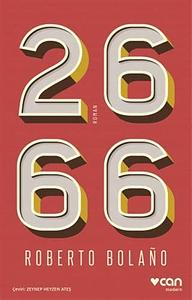Take a photo of a barcode or cover
I especially liked the 1st and last parts of his book. I guess it makes sense that these two parts seem to dance around the, "abysmal", in juxtaposition, middle, which looms beneath their feet. Where Bolaño catches me is his stories of the bitter sweet characters like Hans and Ansky as they navigate the realms between Sysiphus and Thanatos, between the Devil and the Deep Blue Dea.
Great novel that is like five separate books that get loosely sewn together. I’ve never read anything like it and upon reading reviews, was pleased that others felt this way too.
challenging
dark
mysterious
reflective
sad
tense
slow-paced
Plot or Character Driven:
A mix
Strong character development:
Yes
challenging
dark
slow-paced
Plot or Character Driven:
Plot
Strong character development:
Complicated
Loveable characters:
Complicated
Diverse cast of characters:
Yes
Flaws of characters a main focus:
No
Interesting writing but this book is way too big for me to tackle rn
Последняя строка, конечно, очень символична: я сначала не поняла, а потом каааак поняла)
Но, в целом, не моя литература.
Но, в целом, не моя литература.
dark
slow-paced
Plot or Character Driven:
Character
Strong character development:
No
Loveable characters:
No
Diverse cast of characters:
Yes
Flaws of characters a main focus:
Yes
I’ll take “Calling everyone you don’t like a faggot” for $500 please, Alex. Holy hell this book throws that word around like beads on Mardi Gras. This book was insanely boring. I finished it out of spite. The characters were so flat. The dialogue was a snooze fest. The plot goes nowhere. Hell there isn’t even really a plot. Part 4, the longest part at nearly 250 pages, is just listing off brutal anal and vaginal rapes and murders of women and girls from ages 10 and up. Like. It’s excessive. And exhausting. Nothing gets resolved. I hated it. 0/10 do not recommend.
I finally, finally finished this and it was a fight for my life. I know I’m in the minority here, but this was not my favorite. Don’t get me wrong: I found parts of this beyond brilliant — the infamous “Part About the Crimes” was so well crafted and was able to communicate the major themes of the novel in a way that I didn’t find elsewhere in the book — but I just thought it was toooo looooong. Obviously Bolaño is a brilliant writer and this is considered by many (including the NYT’s recent best novels list) to be a masterpiece. And I get it. But I also think it should’ve been published as originally intended: as five separate novels. The sheer size of this one doesn’t do it any favors, especially because the connections between each of the parts aren’t always clear or meaningful imo. I recently read Fernanda Melchor’s “Hurricane Season” and much preferred its approach to similar themes. Anyway, I think it’s an important novel with a lot of important things to say. It just… wasn’t my favorite. Is that fucking okay? Damn
challenging
2666 is less a novel than a necropolitan sprawl, a textual leviathan that refuses the consolations of closure or clarity. Bolaño organizes the work into five asymmetrical parts that feign independence yet pulse with subterranean coherence, like estranged organs sharing a bloodstream. The reader is pulled through a centrifugal narrative: from the bathetic obsessions of Archimboldi scholars to the sterile horror of serial femicides in Santa Teresa, through war-haunted biographies and necrotic landscapes, until causality itself begins to fray. The effect is both maddening and mesmeric, a dialectic between narrative entropy and mythopoeic gravity.
Bolaño’s prose, transmitted with eerie fidelity by Natasha Wimmer, is paratactic, recursive, and dryly incantatory. The novel’s affectless recounting of atrocities functions not as indifference but as indictment, as though the very grammar of realism has collapsed under the weight of historical repetition. Intertextual references metastasize: Borges, Sebald, Bernhard, even pulp noir and the Book of Revelation, all subsumed into a metastable system that resists interpretation while inviting endless hermeneutics. Characters drift, disappear, or dissolve, consumed by Bolaño’s apocalyptic geography where meaning itself becomes fugitive.
Ultimately, 2666 is an autophagic text, a novel that devours itself in the act of becoming. It is obscene in its scope, hermetic in its ambitions, and ineffable in its aftertaste. One does not finish 2666; one is abandoned by it, left to wander its corridors like a penitent librarian in a Borges story rewritten by Thomas Bernhard during a mescaline withdrawal.
Bolaño’s prose, transmitted with eerie fidelity by Natasha Wimmer, is paratactic, recursive, and dryly incantatory. The novel’s affectless recounting of atrocities functions not as indifference but as indictment, as though the very grammar of realism has collapsed under the weight of historical repetition. Intertextual references metastasize: Borges, Sebald, Bernhard, even pulp noir and the Book of Revelation, all subsumed into a metastable system that resists interpretation while inviting endless hermeneutics. Characters drift, disappear, or dissolve, consumed by Bolaño’s apocalyptic geography where meaning itself becomes fugitive.
Ultimately, 2666 is an autophagic text, a novel that devours itself in the act of becoming. It is obscene in its scope, hermetic in its ambitions, and ineffable in its aftertaste. One does not finish 2666; one is abandoned by it, left to wander its corridors like a penitent librarian in a Borges story rewritten by Thomas Bernhard during a mescaline withdrawal.
challenging
emotional
reflective
slow-paced


